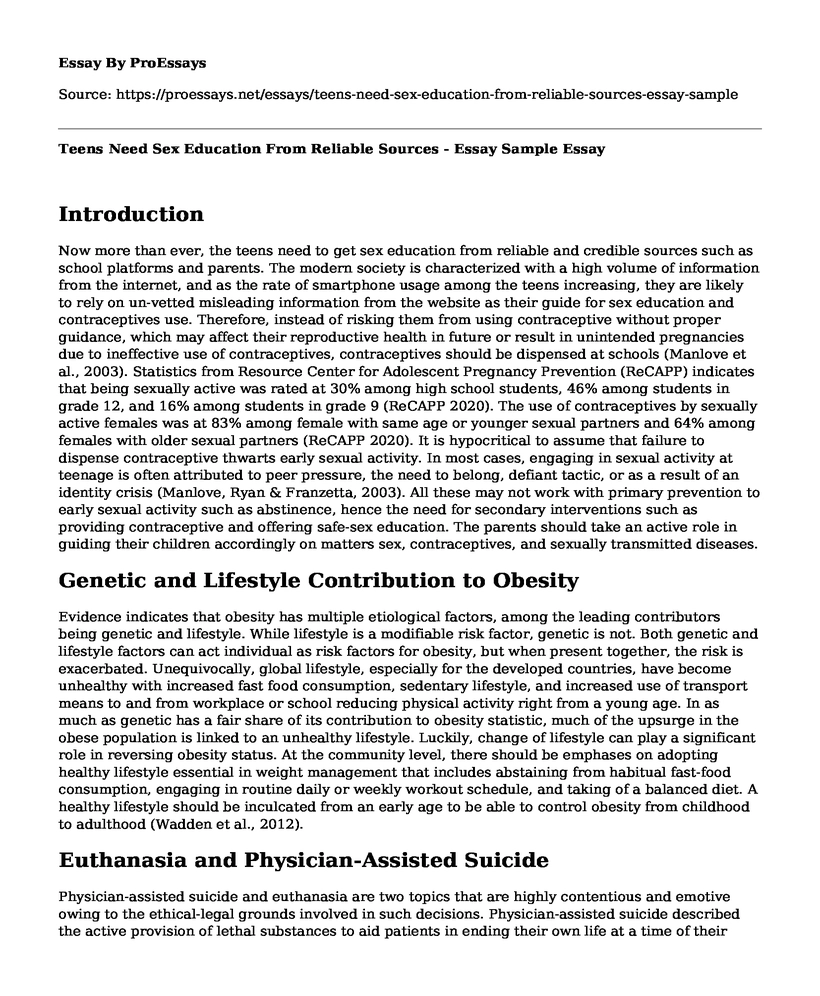Introduction
Now more than ever, the teens need to get sex education from reliable and credible sources such as school platforms and parents. The modern society is characterized with a high volume of information from the internet, and as the rate of smartphone usage among the teens increasing, they are likely to rely on un-vetted misleading information from the website as their guide for sex education and contraceptives use. Therefore, instead of risking them from using contraceptive without proper guidance, which may affect their reproductive health in future or result in unintended pregnancies due to ineffective use of contraceptives, contraceptives should be dispensed at schools (Manlove et al., 2003). Statistics from Resource Center for Adolescent Pregnancy Prevention (ReCAPP) indicates that being sexually active was rated at 30% among high school students, 46% among students in grade 12, and 16% among students in grade 9 (ReCAPP 2020). The use of contraceptives by sexually active females was at 83% among female with same age or younger sexual partners and 64% among females with older sexual partners (ReCAPP 2020). It is hypocritical to assume that failure to dispense contraceptive thwarts early sexual activity. In most cases, engaging in sexual activity at teenage is often attributed to peer pressure, the need to belong, defiant tactic, or as a result of an identity crisis (Manlove, Ryan & Franzetta, 2003). All these may not work with primary prevention to early sexual activity such as abstinence, hence the need for secondary interventions such as providing contraceptive and offering safe-sex education. The parents should take an active role in guiding their children accordingly on matters sex, contraceptives, and sexually transmitted diseases.
Genetic and Lifestyle Contribution to Obesity
Evidence indicates that obesity has multiple etiological factors, among the leading contributors being genetic and lifestyle. While lifestyle is a modifiable risk factor, genetic is not. Both genetic and lifestyle factors can act individual as risk factors for obesity, but when present together, the risk is exacerbated. Unequivocally, global lifestyle, especially for the developed countries, have become unhealthy with increased fast food consumption, sedentary lifestyle, and increased use of transport means to and from workplace or school reducing physical activity right from a young age. In as much as genetic has a fair share of its contribution to obesity statistic, much of the upsurge in the obese population is linked to an unhealthy lifestyle. Luckily, change of lifestyle can play a significant role in reversing obesity status. At the community level, there should be emphases on adopting healthy lifestyle essential in weight management that includes abstaining from habitual fast-food consumption, engaging in routine daily or weekly workout schedule, and taking of a balanced diet. A healthy lifestyle should be inculcated from an early age to be able to control obesity from childhood to adulthood (Wadden et al., 2012).
Euthanasia and Physician-Assisted Suicide
Physician-assisted suicide and euthanasia are two topics that are highly contentious and emotive owing to the ethical-legal grounds involved in such decisions. Physician-assisted suicide described the active provision of lethal substances to aid patients in ending their own life at a time of their choosing in their terminal illness status. Euthanasia refers to ending a patient’s life in advanced stages of terminal illness either done with consent from the patient (voluntary), without consent on a patient capable of consenting (involuntary), or without consent on a patient incapable to consent (non-voluntary). In all the three forms of euthanasia, it can be active euthanasia when the physician carries out the request to end the patient’s life using lethal means or passive euthanasia when the life support system is withheld (Goligher et al., 2017).
In most cases, active euthanasia is often illegal. Legalizing passive voluntary euthanasia under advanced life-support directives can be beneficial for both the physician and the patient. Legally, the physician will be covered while the patient’s autonomy to make a sound decision will be upheld (Goligher et al., 2017). The professional ethical justification of legalizing passive voluntary euthanasia should be assessed objectively as part of managing terminally ill patients unlikely to recover. Such patients should not be retained in a vegetative state by hospitals to make money while giving family false consolation. Instead, they should be allowed to die if they had wished so in a legally binding declaration that indicates they decided while of sound mind. Similarly, non-voluntary euthanasia should also be considered for legalization based on multiple physician recommendations and consent from next of kin. Physician-assisted suicide should also be legalized as long as there is legally binding consent from the patient or next of kin.
References
Goligher, E. C., Ely, E. W., Sulmasy, D. P., Bakker, J., Raphael, J., Volandes, A. E., Patel, B. M., Payne, K., Hosie, A., Churchill, L., White, D. B., & Downar, J. (2017). Physician-assisted suicide and euthanasia in the ICU: A dialogue on core ethical issues. Critical Care Medicine, 45(2), 149–155. https://doi.org/10.1097/CCM.0000000000001818
Manlove, J., Ryan, S. & Franzetta, K. (2003). Patterns of contraceptive use within teenagers’ first sexual relationships. Perspectives on Sexual and Reproductive Health, 35(6); 246 - 255. https://doi.org/10.1363/psrh.35.246.03
ReCAPP. (2020). Statistics on sexual activity. Resource Center for Adolescent Pregnancy Prevention.<http://recapp.etr.org/recapp/index.cfm?fuseaction=pages.StatisticsDetail&PageID=555>
Wadden, T. A., Webb, V. L., Moran, C. H., & Bailer, B. A. (2012). Lifestyle modification for obesity: New developments in diet, physical activity, and behaviour therapy. Circulation, 125(9), 1157–1170. https://doi.org/10.1161/CIRCULATIONAHA.111.039453
Cite this page
Teens Need Sex Education From Reliable Sources - Essay Sample. (2023, Aug 25). Retrieved from https://proessays.net/essays/teens-need-sex-education-from-reliable-sources-essay-sample
If you are the original author of this essay and no longer wish to have it published on the ProEssays website, please click below to request its removal:
- Reasons Why Same-Sex Marriages Should Be Banned Essay
- My Advocacy Program: LGBT Teens and Suicide Risk
- Paper Example on Understanding Sex and Sexualities
- Essay on Same-Sex Couples: A Debate Raging On Despite Growing Acceptance
- Paper Example on Mauritius Teen Pregnancy Survey: Join the Health Coalition!
- Paper Example on Abortion and Religious Freedom
- Exploring Sexuality: Understanding the Truth Behind Assumptions - Essay Sample







